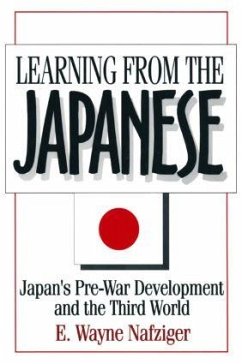This book looks at Japan's early economic modernization to see if today's low-income countries can learn any lessons. The author focuses on education, technology policy, capital formation, the transfer of savings from agriculture to industry, state aid to the private sector, improvement engineering in the informal sector, low wages, industrial dualism, export expansion, and resistance to Western imperialism (a strategy which included acquiring its own empire) under Japan's "guided capitalism". He criticizes modernization scholars for underemphasizing the damage of imperialism and the importance of economic autonomy and technological learning, the dependency school for prescribing trade reduction and neglecting market exchange-rate policies, and world-system theorists for rejecting the possibility of global economic growth.
Hinweis: Dieser Artikel kann nur an eine deutsche Lieferadresse ausgeliefert werden.
Hinweis: Dieser Artikel kann nur an eine deutsche Lieferadresse ausgeliefert werden.








